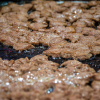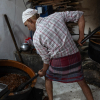Following are samples and translations of different songs sung to various folk and ancestor deities across Rajasthan. These songs were collected over the years in the Thali-Shekhawati region of Rajasthan from a cross-section of communities. Performed by women, they form part of occasions such as marriage and childbirth as well as religious gatherings such as ratijoga (literally, all-nighter).
Goga ji
Goga ji is a bhomiya deity worshipped across parts of north and north-west India. He is also worshipped by Muslims as Jahar Peer. The Kaimkhani sect of Muslims claim descent from him.
Gogaji's iconography is usually associated with snakes and his worship is thought to cure snakebite.
Presented below is an old song focussing on Gogaji’s association with snakes. This song was recorded at a recording session in Ratangarh in the Churu district of Rajasthan in October 2018. The women are from a cross-section of castes ranging from Mali to Oswal.
गोगा आक बळै अक डोडिया
गोगा माँय बळै काळो नाग,
गोगा, गोगाजी री मेड़्याँ झिलिमल चाँनणो
गोगा बळती तो जळती नागण यूँ कैवै
म्हारै बिचया नै दूध पिलाय
गोगा, गोगाजी री मेड़्याँ झिलिमल चाँनणो
गोगा टक्के री मण बाजरी
गोगा पइसा रा मण मोठ
गोगा भूखो रैवै ए भला ए
गोगा, गोगाजी री मेड़्याँ झिलिमल चाँनणो
गोगा टक्के पँसेरी गोगा गुड़ घणो
गोगा फीको खावै ए भला ए
गोगा, गोगाजी री मेड़्याँ झिलिमल चाँनणो
गोगा टक्के पँसेरी गोगा घी घणो
गोगा लूखो खावै ए भला ए
गोगा, गोगाजी री मेड़्याँ झिलिमल चाँनणो
गोगा टक्कै री गज डोवटी,
गोगा उघाड़ो फिरै ए भला ए,
गोगा, गोगाजी री मेड़्याँ झिलमिल चाँनणो
गोगा टक्कै रा दस खोपरा,
गोगा छाणा बाळै ए भला ए,
गोगा, गोगाजी री मेड़्याँ झिलिमल चाँनणो
सामर राणै री मेड़्याँ झबड़ बिलोवणा।
Goga, the aak tree burns.
Goga, inside burns the black naag.
Gogaji’s temple sparkles with lights!
The burning naag says thus.
Feed my kids milk.
Gogaji’s temple sparkles with lights!
Goga, a takka for a maund of bajra.
Goga, a paisa for a maund of moth.
Goga, roams around hungry!
Gogaji’s temple sparkles with lights!
Goga, a takka for five sers of gud.
Goga himself eats unsweetened!
Gogaji’s temple sparkles with lights!
Goga,a takka for five sers of ghee.
Goga himself eats dry!
Gogaji’s temple sparkles with lights!
Goga, a takka for a yard of cloth.
Goga himself roams naked!
Gogaji’s temple sparkles with lights!
Goga, a takka for ten coconut shells.
Goga himself cooks on straw.
Gogaji’s temple sparkles with lights!
There is always overflowing milk and butter at Samar Rana’s temple![1]
Balaji
Balaji is the popular folk form of the deity Hanuman. Several Balaji temples have become major pilgrimage centres, including the ones at Salasar and Punrasar.
This song was recorded in a Meghwal mohalla in Ratangarh in October 2018. The women had gathered at the centre of the mohalla on the occasion of Navami during Navratri for a ratijoga.
बालाजी कुण नै चिणाई देवरो,
कोई कुण नै दिराई गज नींव, बजरंग बालाजी।
बालाजी, राजाजी चिणाया देवरो
कोई सेवगाँ दिराई गज नींव, बजरंग बालाजी।
बालाजी, सूरज सामो दिवरो।
कोई ध्वजा ए फरूकै असमान, बजरंग बालाजी।
बालाजी नेप्यो डोळ्यो देवरो
कोई दिवलो तो जगै रे मुशाल, बजरंग बालाजी।
बालाजी चढन चढावै चूरमो,
कोई ओर झोट्याळा नारेळ, बजरंग बालाजी।
बालाजी, दूराणै दिसा रा जातवी,
कोई लुळ लुळ करै रे सिलाम, बजरंग बालाजी।
बालाजी, म्हे थारी गावाँ छावली,
बालुड़ाँ री राखो रिछपाळ, बजरंग बालाजी।
Balaji, who built your temple?
And who laid its yard-deep foundation, Bajrang Balaji?
Balaji, Rajaji built your temple!
Balaji, your followers laid its yard-deep foundation, Bajrang Balaji!
Balaji, your temple faces the sun!
And your flag soars into the skies, Bajrang Balaji!
Balaji, we have plastered and readied your temple!
Balaji, the lamp burns like a torch, Bajrang Balaji!
Balaji, we offer you churmo![2]
And coir covered coconuts, Bajrang Balaji!
Balaji, pilgrims come from afar!
Balaji, they prostrate and worship you, Bajrang Balaji!
Balaji, we sing your hymn!
Balaji, take care of our children, Bajrang Balaji!
Dodaji Maharaj
The worship of pitarjis or jhujharjis (ancestor deities) is a tradition found across Rajasthan.
This song was recorded at a wedding in a Meghwal family in Ratangarh, Rajasthan. The song is dedicated to their ancestor who was known for his religiosity. The women singing the song informed that they had composed the song themselves.
म्हारै दादोजी म्हाराजाँ री छावली
सारै माता माई रो देवरो
कुण नै चिणाई भगताँ देवरो
कुण नै दिराई भगताँ गज नींव
म्हारै दादोजी म्हाराजाँ री छाँव
सारै माता माई रो देवरो।
बेटा दिराई भगताँ देवरो
पोता दिराई भगताँ गज नींव
म्हारै साचोड़ै भगताँ री छाँव
सारै माता माई रो देवरो।
सूरज सामो भगताँ दिवरो
ध्वजा ए फरूकै असमान
म्हारै दादोजी म्हाराजाँ री छाँव
सारै माता माई रो देवरो।
नेप्यो तो डोळ्यो भगताँ देवरो
दिवलो तो जगै रे मुशाल
म्हारै दादोजी…
चढन चढावै ओ भगताँ सेरणी
ओर झोट्याळा नारेळ
म्हारै दादोजी…
म्हे थारी गावाँ भगताँ छावली
बालुड़ाँ री राखो रिछपाळ
म्हारै घिसजी भगत री छावली
सारै माता माई रो देवरो ।
The hymn of our Dadoji Maharaj
Next to the temple of our Mata Mai.
Who built your temple?
Who laid its yard-deep foundations?
The hymn of our Dadoji Maharaj
Next to the temple of our Mata Mai.
Your sons built your temple.
Your grandsons laid its yard-deep foundations.
The hymn of our Dadoji Maharaj
Next to the temple of our Mata Mai.
Your temple faces the sun.
The flag soars high into the sky.
The hymn of our Ghis ji Bhagat[3]
Next to the temple of our Mata Mai.
We have plastered and readied your temple.
The lamps burn like torches!
The hymn of the true
Next to the temple of our Mata Mai.
We offer offerings of food to you.
And coir-covered coconuts!
The hymn of our Dadoji Maharaj
Next to the temple of our Mata Mai.
We sing your songs, devoted servant.
Protect our children!
The hymn of our Dadoji Maharaj
Next to the temple of our Mata Mai.
Ramdevji
Ramdevji is yet another bhomiya deity with a following across Rajasthan. Ramdevji is closely associated with one of his followers from the Meghwal community, Dali Bai, who has also been subsequently deified. Temples of Ramdevji are always found along with an adjoining smaller temple of Dali Bai.
While Ramdevji was himself a Rajput by birth, he has special following among people lower in the caste hierarchy and is popularly regarded as a symbol of caste subversion. This song sings of both Dali Bai and Ramdevji.
म्हेँ तो गया रामदेवजी रै जात, मिन्दिरयै मैं रम रया।
म्हेँ तो गया रूणेचै रै जात, मिन्दिरयै मैं रम रया।
मिन्दिरयै रा सजन किवाड़, ताळा-कुण्ठा जड़्या पड़्या।
म्हे तो लियो रामदेवजी रो नाम, जिड़या ताळा खुल पड्य़ा।
साधुड़ा रै पाण, बाबो दुनिया पगाँ पड़्या।
साधुड़ा राँधै खीर, डाळी बाई जीम रया।
गिळया मोतीड़ा रो गज हार, हाथ मैं गुलाब री छड़ी।
We went on the pilgrimage of Ramdevji, we were happily in the temple.
We went on the pilgrimage to Runecha,[4] we were happily in the temple.
But the doors of the temple, they were shut with locks.
We took the Baba’s name, and the locks fell off.
Because of the sadhus, the world falls at your feet.
The sadhus made kheer. Dali Bai eats.
A yard-long necklace of pearls in her neck, a rose stem in her hands!
Pitarji
Pitar deities are ancestor deities, unique to a particular family or clan. Family members who die young are believed to become pitar deities.
उगण दिखण स्यूँ जी ओ गाँधी को आयो, आय उतिरयै हिरयै बढ तळै जी।
आय गाँधी का, जी ओ बैठ गाँधी का, तोलै गाँधी को बेटो किस्तूरी जी।
काय री डांडी जी ओ काय रो तोळो, काय रै तिणयै केसर तुळ रई जी?
सोनै री डांडी जी ओ रूप रो तोळो, रेशम रै तिणयै केसर तुळ रई जी।
कुण जी रा पोता जी ओ कुण जी रा बेटा, साचै पितराँ रै केसर अंग चढै जी।
दादोजी रा पोता जी ओ बापूजी रा बेटा, साचै पितराँ रै केसर अंग चढै जी।
कुण जी बुलावै जी ओ कुण जी तुळावै, साचै पितराँ रै केसर अंग चढै जी।
हड़मानमलजी बुलावै जी ओ तिलोकचंदजी तुळावै, साचै पितराँ रै केसर अंग चढै जी।
छोटी सी तळाई जी ओ पाणीड़ो घणेरो, आय पितराँ लस्कर न्हाय ग्यो,
न्हाया धोया देवता जी ओ पितर संतोख्या, म्हारै उजळै तळाई मैं पाणी अंत घणो जी।
छोटी सी बुगचळी जी ओ कापड़ला घणेरा, आय पितरां रो लस्कर पैर ग्यो,
पैरया ओढ्या देवता जी ओ पितर संतोख्या, म्हारै उजळै बुगचळी मैं कपड़ा अंत घणा जी।
छोटी सो भरितयो जी ओ जीमिणया घणेरा, आय पितरां रो लस्कर जीम ग्यो,
जीम्या जूठ्या देवता, जी ओ पितर संतोख्या, म्हारै भरितयै मैं जीमण अंत घणो जी।
छोटी सी बाटकड़ी जी ओ केसर घोळ्यो, आय पितरां रो लस्कर चिरज ग्यो,
चिरज्या पूज्या देवता जी ओ पितर संतोख्या, म्हारै उजळै बाटकड़ी मैं केसर अंत घणो जी।
चौदस नै थे आजो, जी ओ अमावस नै जाजो, म्हारी बाड़ी री बेल बधाजो जी।
भूखा भूखा आजो, जी ओ धाप्या धाप्या जाजो, म्हारी बाड़ी री बेल लड़लूमै।
छोटी सी घंटी जी ओ ठंडो सो पाणी, आज कोठ्यारयाँ कै पितर संतोखिया जी।
From the East has come the purveyor of scents. He rests under the big banyan tree.
He rests. He weighs out the finest musk.
Who is it who has called you? Who purchases your scents?
Hanumanmalji has called you. Tilokchandji purchases your scents. Offerings of kesar[5] to
the true pitars!
What are your scales made of? Your weights?
Your scales are of gold and silk. Your weights, silver. You weigh the finest musk!
Offerings of kesar to the true pitars!
Our small pond (overflowing with water). The pitar hordes have bathed from it.
But wait! It still overflows with water….
Our little trunk (full of clothes). The pitar hordes have dressed from it.
But wait! It’s still full of clothes….
Our small plates (laden with food). The pitar hordes have feasted from it.
But wait! It’s still laden with food….
Our tiny bowl (full of kesar). The pitar hordes have been smeared from it.
But wait! It’s still full of kesar…
What miracles!
Come on the fourteenth day. Leave on the fifteenth. Bless the vine of our house.
Come hungry. Go satiated. The vine is laden with flowers.
A little jug of cool water (to sprinkle). Today we worshipped the pitars[6] of the Kotharis!
Notes
[1] Aak is a shrub; naag means snake, takka is a coin of half anna value, maund and ser are units of weight, and gud means jaggery.
[2] A Rajasthan staple of rotis or dumplings (bati) with ghee and jaggery/sugar.
[3] Ghis ji was a devotee and caretaker of the Mata ji temple being referred to. This song is an ode, composed when he died.
[4] Runicha in the Jaisalmer district has the major Ramdevji temple.
[5] Saffron
[6] Pitar means ancestor/ancestral deity, kesar is saffron.












